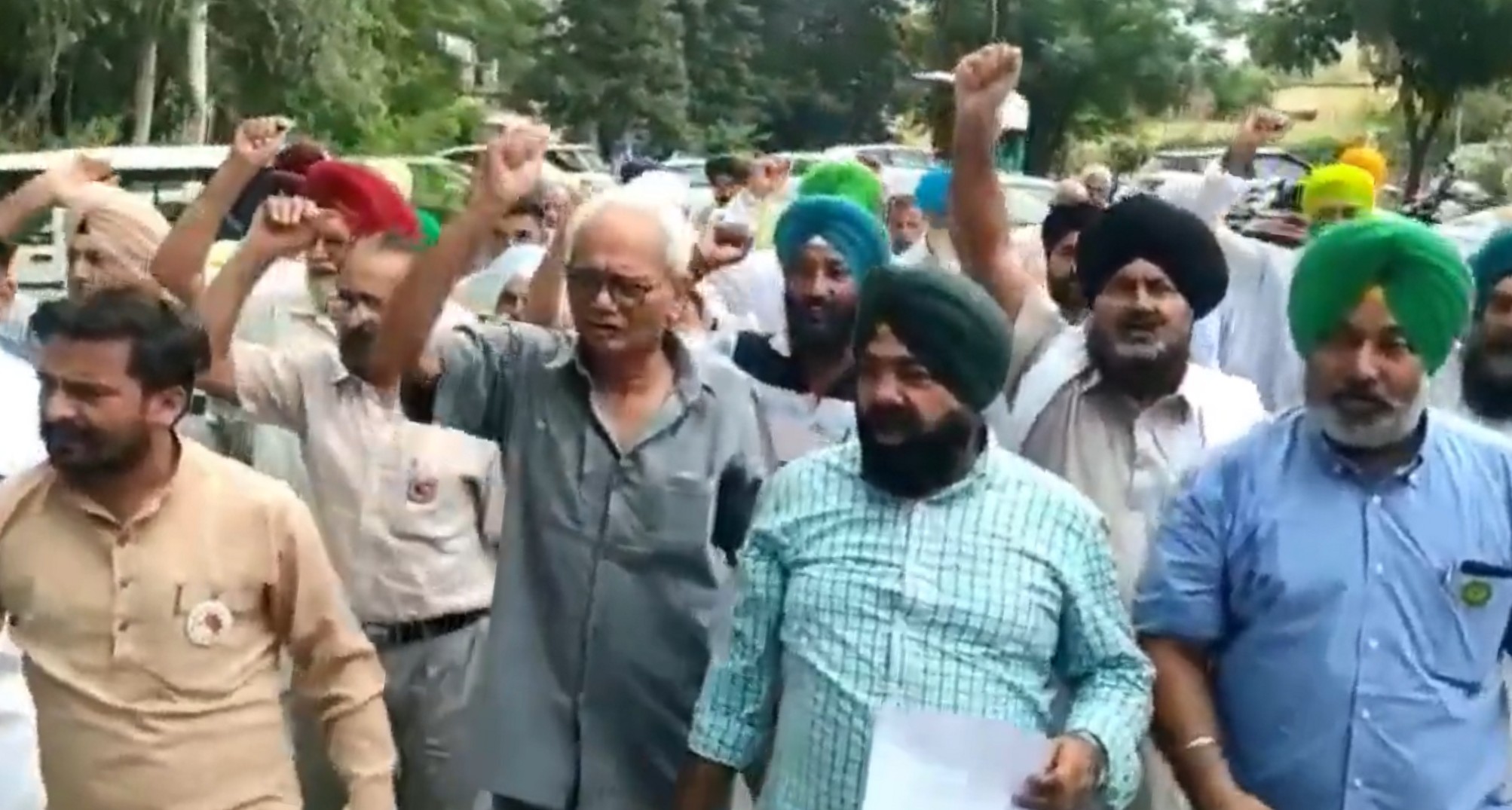 | |||||||
On August 15, we celebrate the birth, life and work of Hardial Bains, founder and leader of the Communist Party of Canada (Marxist-Leninist). Hardial Bains was, above all else, a man of revolutionary action. He came to Canada as a youth from India in 1959 and immediately integrated with the life of the working people in British Columbia and took up the struggles of the student youth with whom he shared weal and woe. The late Charles Boylan, who was also a youth at the University of British Columbia at the time Hardial got a science degree, wrote about the conditions in those days. "Imagine
the situation. The world, including the entire range of ideological and
theoretical schools of thought, was frozen in Cold War dogma.
Disinformation and misinformation were the norm, whether it came from
the schools of Euro-American imperialism or the schools of Euro-Soviet
communism. A condominium of reaction undermining the historic
achievements of communism, revolution and national liberation was in
place. All avenues to independent analysis and thinking were barred in
practice if not in scripture. Yet the feeling 'the world is not going
to remain the same' was pressing on the hearts and minds of the youth.
The necessity for change was impelling. What was missing and most
needed? What key was necessary to unlock that dialectic of change? "In 1963, Hardial Bains was a 23-year old graduate student at UBC, who four years earlier immigrated to Canada from Punjab, India to study microbiology. In Punjab, Hardial had earned a well-respected reputation as a deep-thinking revolutionary communist and scientist whose political activism and scientific investigation were said to have begun the moment he could breathe on his own. But what to make of this world in the imperialist heartland and internationally, in which the conditions were so complicated that even the idea of a proletarian front for revolution had been declared a dead letter even by many communist parties?
"The Cold War was suffocating everyone to the point where the right to conscience was banned. Hardial Bains refused to accept the block on thinking and called on students and faculty to defend themselves and express their right to conscience through actions with analysis. One of his first public acts was to stand up courageously to the 'better dead than red' psychological terrorism of McCarthyite anti-communism. At a mass democracy meeting, standing atop the popular soap box in the public square in front of UBC library, Hardial faced down the hysterical finger-jabbing scream from the fringe, 'That man is a communist!' replying instantly, 'Yes, and proud of it!' "Reflecting upon the incident later, Hardial said this response was a historic turning point in the sense that it publicly 'smashed the cringing cowardice and spinelessness of the communists of the time.' The refusal to defend one's right to conscience became a feature of the past. Communists were called upon to be open and proud of their views and the accomplishments of the workers' and communist movement. This was the 'beginning of the New. Nothing can stop this movement now,' he concluded from this experience. But the New was small like a single cell of an organism beginning its journey in life." Hardial had the ability to listen to and heed the call of history to organize to bring about the changes required to open society's path to progress, always keeping in sight how to remove the main obstacle to moving forward. He based his actions on what the situation revealed in the particular conditions and circumstances, ensuring an organization was put in place to gather together all those in whose interest it was to bring about the required changes to the conditions. For this to occur, he always followed the dictum: Unite the Advanced Forces to Mobilize the Middle and Isolate the Backward. He made sure that the clash between Conditions and Authority would be resolved in a manner which favoured the interests of the working peoples at home and abroad and the cause of the peoples and nations everywhere for peace, freedom and democracy. Hardial Bains heeded the call of Engels that Marxism is Not a Dogma but a Guide to Action. He also profoundly followed the maxim No Investigation, No Right to Speak to emphasize the necessity of going into the heart of the matter at any time so as to discern the line of march and devise as its integral part the tactics required to achieve the aim set. In this way, Hardial set an example of what it means to oppose the disinforming role of the state, which seeks to deprive the people of their own ability and outlook to establish their own vantage points and act in a manner which favours their interests.
As he famously wrote in the Necessity for Change pamphlet, which sold thousands of copies amongst the youth and students and revolutionary forces in the 1960s, this call places revolutionary action at the centre of all our endeavours. Only when an individual is in the fray, in the battle, with the aim of humanizing the social and natural environment in the specific circumstances faced, does the line of march emerge from what the situation reveals. Only on this basis of putting revolutionary action at the centre of our concerns, can one be worthy of calling oneself a Marxist-Leninist, Hardial pointed out. By paying attention to what is continuously coming into being and passing away, which we call the ensemble of relations of humans to humans and humans to nature, the necessity for change is revealed as the need for the people to establish their own political power in the course of settling scores with the old conscience of society. Only then will the pre-history of humankind give way to the people themselves becoming the makers of history. From the old way of handing over the use of their voice and name to others, the people will finally speak in their own name, Hardial forcefully pointed out. At each stage of the development, Comrade Bains led members and supporters to achieve numerous significant accomplishments, including: - uniting the Marxist-Leninists in one organization based on Marxism-Leninism and democratic centralism in the late '60s; - founding the Communist Party of Canada (Marxist-Leninist) in 1970, as the necessary instrument to forge the unity of the working class to accomplish its mission of constituting the nation and vesting sovereignty in the people; - taking bold stands in defence of all when the state launched racist attacks against Afro-Canadian students, as well as the Indigenous peoples and peoples of South Asian and West Indian origin in the late sixties and early seventies; - establishing on a profound anti-imperialist basis the solidarity movement in this country to support the struggles of the peoples of Asia, Africa, Latin America and the Caribbean for liberation. Included within all this was the militant support he organized for an independent Cuba against the Bay of Pigs invasion and during the so-called missile crisis, and for the national liberation of Vietnam and other countries of Indo-China fighting against U.S. imperialist aggression. He also led the reorganization of the Hindustani Ghadar Party abroad in 1969, on the basis of democratic centralism to carry forward the traditions of the Ghadri Babas and for the liberation struggles in India. Hardial's important contributions also included the defence of Marxism-Leninism and the elaboration of Contemporary Marxist-Leninist Thought. His work in the field of philosophy and the social sciences included paying first-rate attention to the crucial relationship between form and content, and to the study of Marxism-Leninism amongst the youth, and to push forward the movement for enlightenment. He spearheaded building the Party press and non-Party press and the technical base for the work of the Party on every front. His contribution to the study of the constitution of European nation-states and how sovereignty was established in a fictional person of state to deprive the people of decision-making power led to the powerful program of opposition to euro-centrism, reliance of each people on their own thought material and for democratic renewal and the call to break with the past and move on.
|
| |
 Hardial Bains speaks to the Third Annual
Convention of the East Indian Defence Committee in 1977 (left); and at
a rally held in conjunction with the founding of the People's Front in
Vancouver, November 22, 1980.
Hardial Bains speaks to the Third Annual
Convention of the East Indian Defence Committee in 1977 (left); and at
a rally held in conjunction with the founding of the People's Front in
Vancouver, November 22, 1980.
 Hardial Bains in march at
the founding convention of the Democratic Women's Union in Vancouver,
March 8, 1981 (left); and in conversation with the youth, August 30,
1992.
Hardial Bains in march at
the founding convention of the Democratic Women's Union in Vancouver,
March 8, 1981 (left); and in conversation with the youth, August 30,
1992.
Hardial paid close attention to cultural matters, including sports festivals, music and literature. He assisted organizations of cultural workers in Canada and Britain and he himself contributed songs and poems that inspired all those in struggle to battle on, undaunted. As a phrase from one of his poems engraved on the Party Monument at Beechwood Cemetery brings out: "Let the march go on for the road is clear. Let the modern human being make history. Something is calling, Move On."
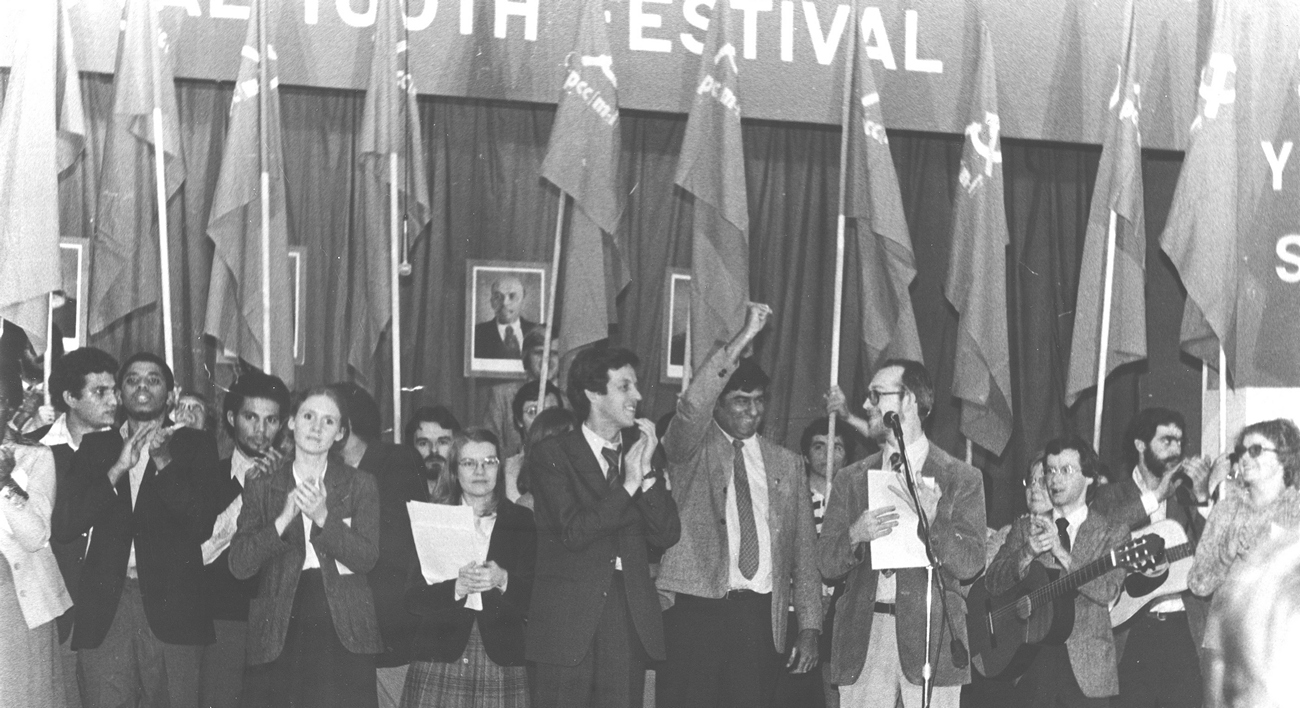
Hardial Bains at the
Second All-Canada National Youth Festival in 1979.
A red thread connecting his politics was the ideological struggle against the revision or dogmatic rendering of communist principles. Many of his writings address how the abandonment of progressive ideals and socialism was at the heart of the conflict in the former Soviet Union and Eastern Europe and the betrayal of the peoples' cause in various countries of the world. The fight against this abandonment was a salient feature of his activities from the 1960s.
As part of this, Hardial also played an important role in assisting the communist parties and organizations coming into being worldwide in the 60s and 70s and after. His internationalism was such that he never interfered in the internal affairs of others while also encouraging those in each country to be their own models and stand on their own two feet. In the 1990s, he assisted in organizing International Seminars on common problems. Seminars covered topics like the Retreat of Revolution, the Necessity for Modern Definitions, the Definition of the Modern Democratic Personality, Eurocentrism, Minority Rights, Communism and Human Rights, amongst others. He contributed greatly to strengthening working relations so as to analyze and assess world developments and ensure the political discussion needed by all was organized.
|
Hardial Bains was greatly admired amongst his colleagues and those he met in the course of his political activities for his dedication to the progress of humanity and adherence to the most advanced principles. The Canadian ruling elite despised his politics and targeted him for attack under the notorious program Operation Chaos led by the U.S. Central Intelligence Agency. He was continually slandered and defamed. He had to fight and defeated several fraudulent lawsuits aimed at criminalizing and discrediting him and he defied several attempts to assassinate him including trying to force the car he was in off the road and setting fire to its gas tank and other such desperate acts. He was the subject of an Interpol warrant during the War Measures Act in 1970, and denied Canadian citizenship until 1988, which carried with it the denial of the rights of his spouse and children. He was also deprived of his passport by the government of India from 1975 to 1977 during the emergency declared by Indira Gandhi. He was under the constant surveillance of the FBI and denied entry into the United States.
With the collapse of the Soviet Union in 1989-90 and the end of the bi-polar division of the world, Hardial took up bold all-sided work to create the conditions for the empowerment of the people and to resolve the all-sided crisis with economic crisis at the base, in their favour. His work for the democratic renewal of the political process gives the direction the polity requires today. He presented a brief on behalf of CPC(M-L) to the Royal Commission on Electoral Reform and Party Financing in 1990. Later, in 1992, he led the Committee to Vote No on October 26, which spearheaded the effort to defeat the reactionary Charlottetown Accord referendum by which the ruling class tried to reform the Constitution of Canada while keeping the polity divided, the working people in an inferior position, the Indigenous peoples oppressed and the rights of the Quebec nation denied. The Committee to Vote No prevailed in the face of the entire establishment forces badgering the people to vote yes. To assist the No campaign to win victory, Hardial published two books dealing with the constitutional problem in Canada -- The Essence of the Consensus Report on the Constitution and A Future to Face. He subsequently published a third book in 1993, A Power to Share, to show the way forward. A Power to Share focused on the necessity to carry out the democratic renewal of the political process. With the momentum and unity gained from the successful campaign to defeat the Charlottetown Accord, Hardial spearheaded the founding of the National Council for Renewal, which led to the creation of the Canadian Renewal Party as a non-partisan political association to continue the work of empowering Canadians.
 Hardial Bains speaks at meetings in
Toronto (left) and Ottawa as part of the work in 1992 for Democratic
Renewal and for a "No" vote on the Charlottetown Accord.
Hardial Bains speaks at meetings in
Toronto (left) and Ottawa as part of the work in 1992 for Democratic
Renewal and for a "No" vote on the Charlottetown Accord.
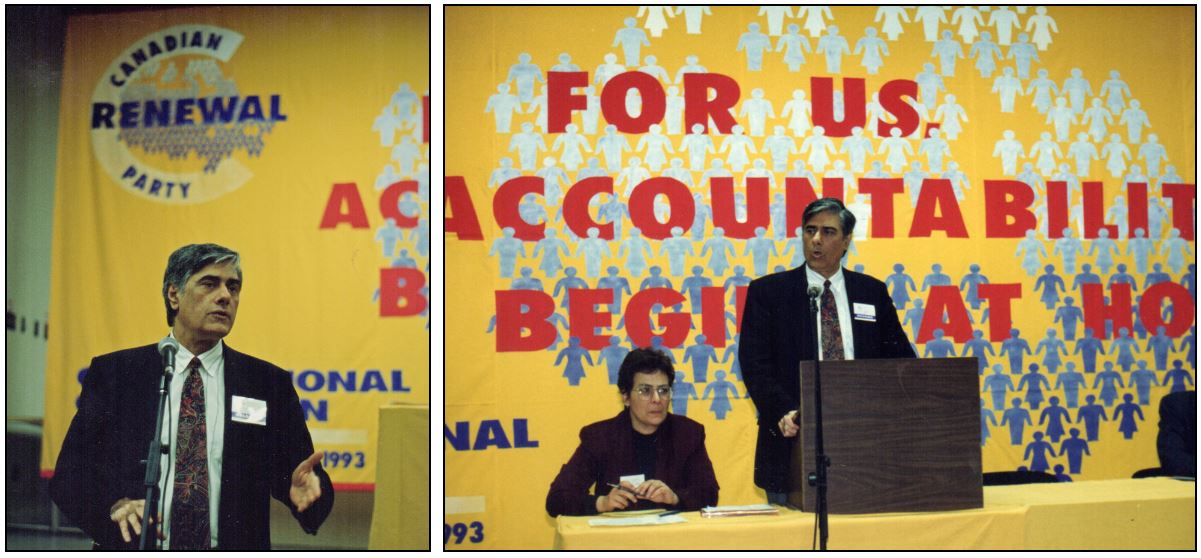 Hardial Bains speaks at the
constitutional conference of the Canadian Renewal Party held in Ottawa,
September 11-12, 1993.
Hardial Bains speaks at the
constitutional conference of the Canadian Renewal Party held in Ottawa,
September 11-12, 1993.
In 1995, he launched an Historic Initiative, a nation-building project which calls for the working class to constitute the nation and vest sovereignty in the people. His theoretical work focused on the need to settle scores with the old conscience of society in a manner which enables the modern democratic personality to emerge. Hardial embodied that democratic personality, with its social love and striving for a humanized society fit for human beings and nature. While his life was cut short by cancer in 1997, his life and work carry on in the ongoing work of the Communist Party of Canada (Marxist-Leninist) and in the hearts, minds and deeds of the younger generations that are following in his footsteps.
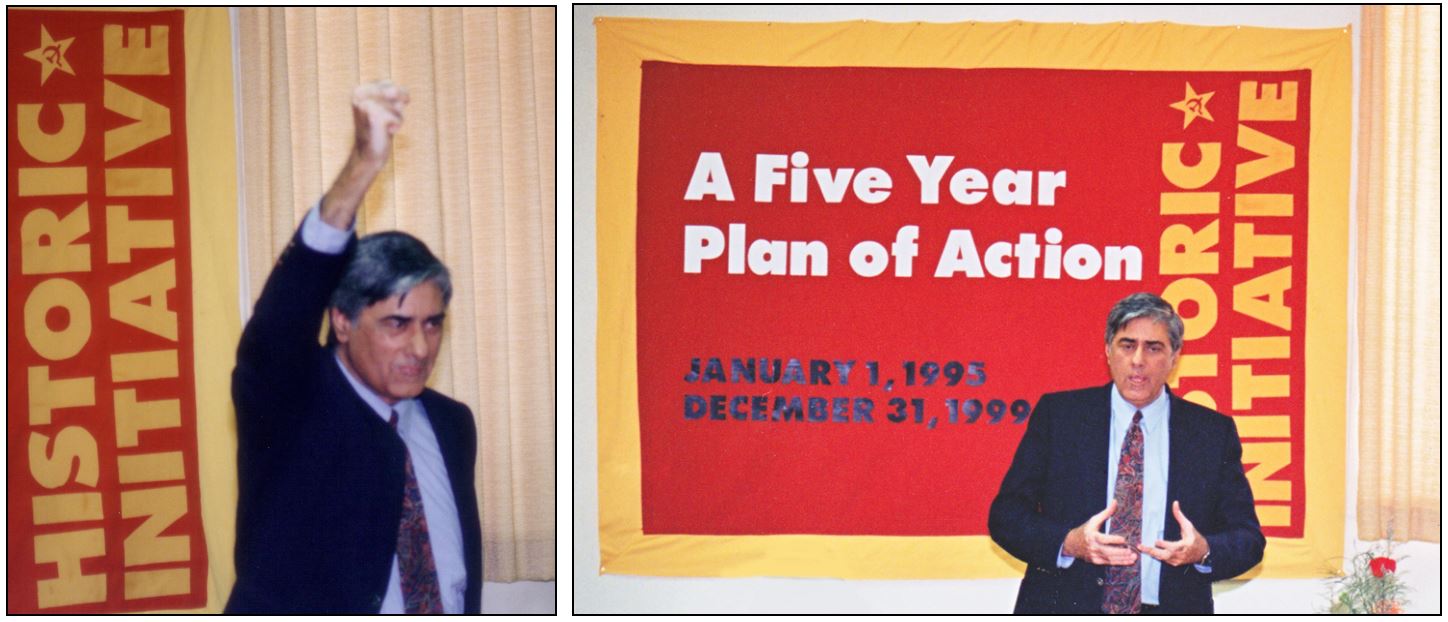 Hardial Bains launches
CPC(M-L)'s Historic Initiative in Ottawa, January 1, 1995.
Hardial Bains launches
CPC(M-L)'s Historic Initiative in Ottawa, January 1, 1995.
(Hardial Bains Resources Centre)
August 15, 1947
Legacy of Indian Independence 75 Years Ago
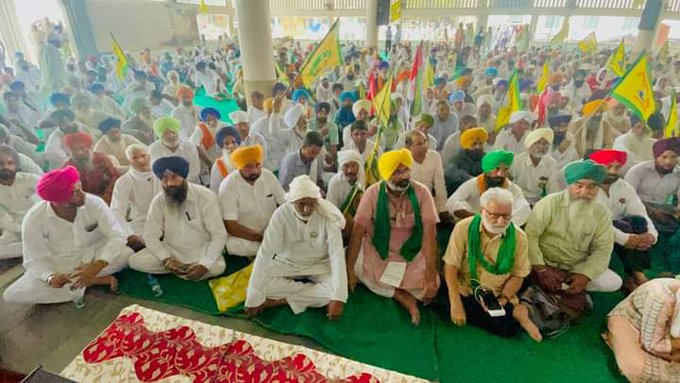
Farmers' morcha in Haryana, Punjab, August 9, 2022, against the
Modi government's land acquisition program. The farmers affirm they will
not permit the government to snatch the land from those farmers who
made it fertile before 1947.
The 75th anniversary of Independence of India finds hundreds of millions of farmers on the barricades of struggle for their very being and Right To Be. They are carrying out protests all across India today against the anti-people policies and laws of the government. Kisan Mahapanchayats (local mass meetings) are taking place. Kisan Mazdoor Ekta (Farmer-Labourer Unity) slogans are in the air -- Faslan Ke Faisale Kisan Karega (Farmers will decide on crops), and Awaz Do Hum Ek Hain (We are one voice) are resounding. In a Mahapanchayat in Bijnor, Uttar Pradesh, farmers declared that they will continue their struggles in all forms until their demands are met. They said that it is battle for Fasal and Nasal (for their produce and future generations). This is a battle for land and life. Once again tractors and trolleys are out.
At midnight on August 14, 1947, in a tryst with destiny speech, promises made by Nehru and all political parties of the ruling elite since, have proven to be false and fraudulent. Peoples of India had shed torrents of blood to overthrow the colonial rule but the Transfer of Power in 1947 continued all the colonial institutions in service of a tiny minority of collaborators with the British, to maximize the profits and interests of the ruling elites, including the former colonial masters. People everywhere say that this is not the India that we had fought for. Colonial rule is continuing without the colonialists, which was imposed by communal carnage killing millions of people and moving forcibly more than 20 million people.
All the concessions that the ruling elite was forced to give in 1947 due to the struggles of women, men, workers, farmers, Dalits, tribal people, nations and nationalities are under attack. For example all the gains in the field of livelihood, franchise, education, labour laws, health, federal structure, welfare, social justice, land reforms, freedom of speech, as meager as they were have been eroded and torn asunder by the ruling elites. Especially in the last 40 years, the neo-liberal offensive launched by Congress, intensified and accelerated by BJP has wiped out all the gains of the independence movement of the people. The wealth of the industrial houses and families such as the Adanis, Ambanis, Tatas, Birlas, etc. has skyrocketed while 99 per cent of the population has a hard time keeping body and soul together.
Government data presented in Parliament recently shows that more than 80 per cent of Indians are likely to be drinking "poisonous water." The data presented says that most districts of almost all states have groundwater overloaded with toxic metals and metalloids. In some parts of 209 districts of 25 states, there's over 0.01 mg arsenic per litre of groundwater. In some parts of 491 districts of 29 states, iron in groundwater is more than 1 mg per litre. In some parts of 29 districts of 11 states, cadmium in groundwater has been found to be more than 0.003 mg per litre. In some parts of 62 districts of 16 states, there is more than 0.05 mg of chromium per litre of groundwater. More than 0.03 mg per litre of uranium has been found in groundwater in 152 districts in 18 states. This exemplifies the continuous crimes against the peoples of India and nature by the ruling elite in the last 75 years.
Data provided by the government states that every year 2.5 million people die of hunger and in the last 40 years, the ruling elite has killed 100 million people by starving them to death no matter which party has been in power, no matter which slogans they have espoused in the name of eliminating poverty and guaranteeing the prosperity of the people. More than 50 per cent of tribal populations have been displaced and dispossessed of their forest, water, land and habitat. Caste oppression continues unabated.
Punjabis to this day recall partition as ujara or devastation. More than 7 million people were forced to leave their homes and hearths due to the terror unleashed by the ruling elites, the British, their goons and police. Studies by Harvard scholar Jennifer Leaning and others point out that more than 3 million people were slaughtered. Prominent political scientist Ishtiaq Ahmed, in his book Punjab Bloodied, Partitioned and Cleansed has meticulously documented it. Partition projects in many universities and research by an increasing number of professors have brought to light the crimes of the ruling elites and their representatives. For example Jinnah callously called this bloodshed a Qurbani (sacrifice) required to create Pakistan. Similarly, leaders of Congress called partition the price of freedom. It reveals the criminal nature of the leaders of Congress, the Muslim League and the British.
In Lahore and Amritsar the armed gangs affiliated with the Akalis, the Muslim League and Hindu Mahasabha terrorized the people. Rajas, Maharajas, Wadheras unleashed their soldiers on the unarmed and innocent people. Now, using social media, Punjabis in East and West Punjab are sharing their stories and trauma. On August 16, special Ardas (prayers) are taking place at the Akal Takht for those who were slaughtered and died during partition. Gurdwaras across the world are also going to hold Ardas. Punjabis across the world are appreciating this initiative and are continuing their struggles for the affirmation of their national, cultural and linguistic rights, their right to be.
Modi is serving "nectar of freedom" from the Red Fort in Delhi, while attacking the rights of all the peoples of India, just like Nehru at midnight on August 14,1947 who talked about "wiping tears from every eye" while the ruling elite was carrying out carnage on the basis of religious and ethnic cleansing. It is reported that "secular" Nehru took a bath in gold dust as advised by his astrologer because he was stepping down from a Brahmin to Kshatriya to be prime minister and he held the ceremony at midnight according to Mahurat by astrologers.
What cannot be forgotten in rendering the history of Partition is that from midnight August 14,1947 to the present, a glorious history of peoples struggles has countered the shameful demagoguery by the representatives of the ruling elites, their parties, legislatures and the crimes against the people, no matter which party has been placed in power at either the central or state level.
Farmers of India along with other toilers and oppressed, have given a clarion call for renewal and renovation of relations among humans and humans and humans and nature, to affirm the rights of all. Peoples' security lies only in their fight against the ruling elite and their state. Farmers have declared that no matter what Modi says from the parapets of the Red Fort, as have many others before him to hoodwink people, they will march on and carry on until rights of all are affirmed. Creating bright future prospects are for the people to make. The women, farmers, workers, youth, Dalits, Adivasis and the oppressed are the makers of the history which is unfolding in India.
On this occasion, I think of Bhagat Singh who had prophesied that this struggle will continue if brown sahibs replace the white sahibs and no transformations take place. I think of Baba Sohan Singh Bhakhna, founder President of the Ghadar Party, who told us in 1967 that he was tortured more by Nehru's government than the British. I think of my grandfather who had predicted this trajectory because the leaders of the Congress Party, the Communist Party of India and the Communist Party of India (Marxist) had betrayed the aspirations of the people, and he had contempt for them. I especially think of Hardial Bains, my friend and mentor, who remained true to the aspirations of our people till his last day. His paper, Breaking with the Past -- The Last Reform, was delivered at a meeting in Delhi on his behalf, on August 15, 1997, on the 50th anniversary of India's independence. That paper to this day points the way forward to bring about the transformations needed by the peoples of India and South Asia.
Last but not least, I also think of 82-year-old poet Varvara Rao, who has been incarcerated on trumped up charges for speaking his mind, but keeps his head high and chest out, inspiring the youth. He just received bail on medical grounds. I also think of the Facebook, Twitter and other social media warriors who are amplifying peoples' struggles for dignity.
A great battle of ideas for renewal of thought material of the peoples of the Indian subcontinent as well as the world's people has also broken out to create a new society which harmonizes the ensemble of human relations, between humans and humans and humans and nature. Everything is up for grabs. No more can old thought material and its phrases and platitudes about "Left" or "Right," " Hindu Rashtra" or "Secularism" suffice. Their repetition is a diversion organized by the ruling elite. People are getting together to overcome the crisis of imagination about what the society engenders which can serve the people. The farmer's Morchas showed it to the whole world. They pointed out in their 14-month long deliberations that the liberal democracy is a system of party rule to choose representatives of a fictitious person of state where sovereignty is vested. It is not vested in the people as they are led to believe but in a hidden power above the people. The democracy based on this theory and the arrangements which were brought forth on its basis have become historically obsolete, independent of anyone's will. This is because the productive powers have surpassed the control of both the rulers and the working people. The times are calling for the working people to open society's path to progress by bringing them under control on the basis of modern definitions of democracy, for a mass democracy in which the people are the decision-makers and set the line of march which opens a path for progress.
The cartel parties are no longer political because they do not serve the polity. They have formed a mafia cartel kept in place by narrow private interests to deprive the people and disempower everyone except themselves. This is why during the Morchas, the farmers did not allow the leaders of the cartel parties on their stage. They formulated a vision of Mass Democracy in which citizens directly participate in making decisions that affect their lives. Ideas of community control of natural resources and how to execute democracy in action were discussed in detail. Farmers have declared that they are building their organizations in 600,000 villages of India to raise awareness amongst the people about how a new society can be brought into being.
A part of this great battle of ideas is the work of Dalit scholars, who have educated themselves against all odds, to settle scores with dehumanization and caste oppression. They are working very hard to bring to light the "untold" history and conditions of the toilers, artisans and untouchables. Many young Pali scholars have published a great body of work to bring to light the "forgotten" history and restore dignity to the oppressed and exploited women and men. Their work has broken the monopoly of colonial and Brahmanical writers and is etching the course for the history as created by the people, both past, present and future.
In order to drown the struggles for renewal and renovation, dignity and justice of farmers, toilers, Dalits and others in blood, the ruling elite is using their favorite weapons of communal violence and state terror to divert and distract the people. The representatives of the ruling elite are inciting people against Muslims claiming that they are the cause of the problems of farmers, workers, women, Dalits and others. Armed gangs protected by police are threatening and intimidating people.
This attack on Muslims and others is an attack on the rights of all the peoples of India. Farmers have understood it and have boldly declared that it is a ploy to attack the unity of people. They have formed defence committees, sadbhavna (goodwill) committees and peace committees to oppose these attacks. Workers, youth, students, and women are also in action to counter these attacks. Solidarity committees are being formed in towns and cities.
Speaking philosophically, a great dialectic is unfolding, smashing the blindfold of anti-consciousness.
Zindabad!
The Last Reform: Breaking with the Past
Farmers in Mukerian, Punjab hand over a demand letter to the Sub-Divisional Magistrate regarding farmers' demands and burned copies of the electricity amendment bill, August 9, 2022.
"The Last Reform: Breaking with the Past" by Hardial Bains was presented to the conference "Building the Future" organized by the Committee for People's Empowerment in Delhi, India, August 13-15, 1997, to mark the 50th anniversary of the formal independence of India, Pakistan and other countries of South Asia on August 15, 1947. |
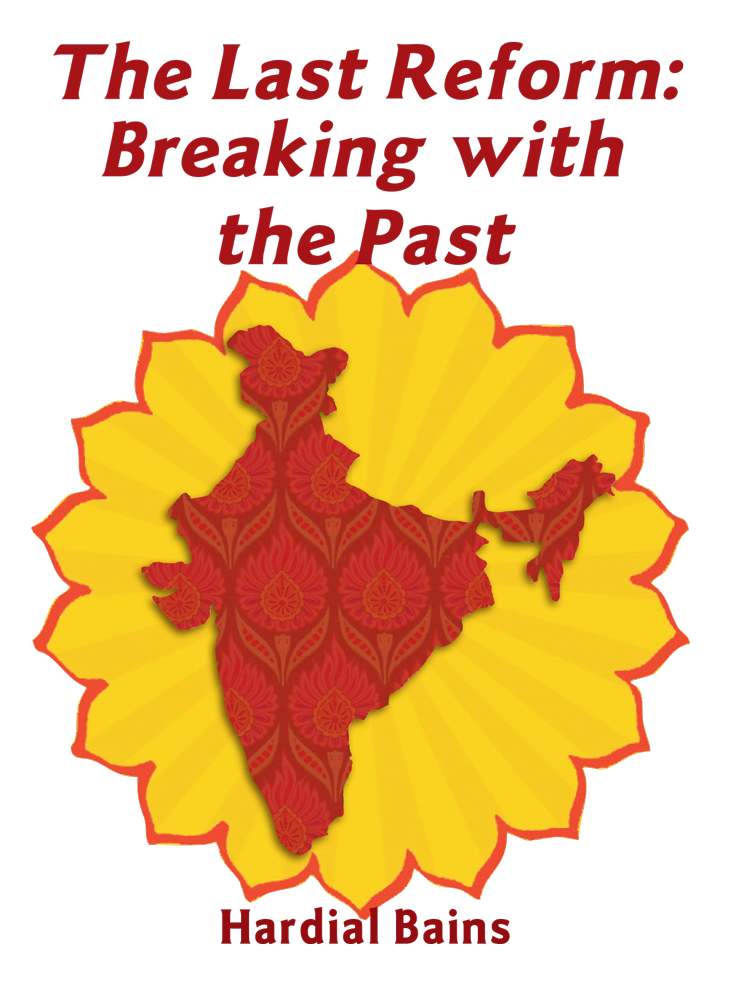 |
Introduction
Hardial Bains points out right in the beginning of his paper, "The main thesis of this paper concerns the fact that all economic and political theories as well as philosophy and world outlook which exist at the present time, all systems and institutions need immediate renewal. Renewal means either starting afresh -- the sure way to create the present and future -- or a restructuring of what has already been -- the renewal of the past so as to ensure its continuation. All countries of South Asia need renewal of the former kind, a fresh start, as all their problems stem from the fact that the break with the past was not made fifty years ago, a fresh start was not made at that time."
Discussing the Indian constitution, its history and practice, the author goes to the central issue: the Indian constitution is not based on the struggles of the peoples of South Asia and thus it does not codify the arrangements for which they had shed torrents of blood to win liberation.
"A Constitution which does not enshrine basic principles which a people have fought for in practice, which does not codify the new arrangements which people have brought into being through their struggles, will not enshrine the sovereignty of the people. It is an insurgent people who establish their rule, establish their state and write their constitution. In the case of India, it is not the principles for which the Indian people fought and shed their blood which were enshrined in the Constitution. The primary source of the Constitutional principle was not the struggles of the peoples themselves. It is not for nothing that the struggles of the Indian people for independence are not even mentioned by the historians as a source which inspired the Constitution when it was drafted."
Hardial Bains proposes that the people of South Asia must undo this basic structure of power which completely marginalizes them from decision-making. They must create a new political power based on their struggles and thought and the experience of the world's people to solve problems faced by them. This is the basic reform that they need to get rid of grinding poverty, misery and exploitation and lead a life of dignity and justice.
Referring to the criteria introduced by Elizabeth I when she issued the Charter of the East India Company in 1600 that the arrangement must be "beneficial," Hardial Bains points out: "The question which arises is this: Should the peoples of South Asia not extinguish this power which the British transferred to their counterparts in India in 1947 so as to establish their own power which will not only be 'found beneficial' to them but with which they will also establish relations with the peoples and countries of the world on the basis of 'mutual benefit'?"
Hardial Bains points out: "When Elizabeth I issued the Charter to the East India Company in 1600, she threatened to withdraw it if it was not 'found beneficial' but she never spoke of establishing relations of trade, commerce and culture on the basis of 'mutual benefit.' All the measures taken in South Asia which finally led to its entire takeover by British colonialism were 'found beneficial' only to the British, their allies and the classes they were creating in whose interest it was to defend this system later on. Such a system can be overthrown and a new one established if the past power is extinguished and a new power is built. Such is the question which presents itself today to the peoples of South Asia."
Several themes run through this paper that the youth of today can elaborate:
1. Why was the formal independence of 1947 a defeat for the peoples of South Asia? What is the nature of the present political institutions in South Asia -- in words and in deeds?
2. What were the struggles of the peoples of South Asia for? What was their aim and how did they get diverted and hijacked?
3. How does the Royal Prerogative operate in the Indian constitution through the notion of Trusteeship? What was the nature of the Transfer of Power Act?
4. How does the theory of White Man's Burden work today in the Indian democracy?
5. What mechanisms must be built today to ensure and enshrine Sukh and Raksha of the people?
6. How can Praja rather than the Trustee be sovereign once again?
Thesis
One of the greatest defeats for the peoples' of South Asia in 1947 was that they won their formal independence on the basis of the full acceptance of the British colonial institutions, their economic system and their theories and practices as well as the formal division of their sub-continent on the basis of religion. Such a defeat for the peoples of South Asia is, fifty years later, the source of all their tragedies, including the danger of a world war which the superpowers will launch in order to conquer the Indian Ocean as an integral part of conquering the Atlantic and the Pacific.
The title of this paper, "The Last Reform: Breaking With The Past," has been chosen for very definite reasons. The most important reason is that people do want to know what must be done at the present time to open the door for the progress of the societies of South Asia. This is one of the questions which not only concerns the experts but millions of down-trodden, more than fifty per cent who are on the margins of life, workers, peasants, women, youth and intelligentsia, and specifically the working class, peasantry and all the toilers of the lands of South Asia. They all want to set a course for their countries for the next fifty years and more which will guarantee their interests. What is it that they must do to overcome grinding poverty, break the cycle of exploitation and oppression which is getting worse with every passing day? What is it that they must do to make history not repeat itself? What is it that they must do to break with the past because their past is the past of a marginalized people under the sway of alien systems and institutions and only by breaking with that past can they create a present and future for themselves.
The main thesis of this paper concerns the fact that all economic and political theories as well as philosophy and world outlook which exist at the present time, all systems and institutions need immediate renewal. Renewal means either starting afresh -- the sure way to create the present and future -- or a restructuring of what has already been -- the renewal of the past so as to ensure its continuation. All countries of South Asia need renewal of the former kind, a fresh start, as all their problems stem from the fact that the break with the past was not made fifty years ago, a fresh start was not made at that time.
In the book Our Constitution (1995), the author, Subhash C. Kashyap, who had written extensively on the Indian Constitution and who was Secretary-General of the Lok Sabha from 1984 to 1990 and "is an advocate and consultant in constitutional law, parliamentary affairs and political management," writing about well known facts, confirmed that the "founding fathers" "took a conscious decision not to make a complete departure from the past." He writes, "In fact, the sources of some of the provisions of the Constitution can be traced back to the beginnings of East India Company and British rule in India." "...nearly 75 percent of the Constitution can be said to a reproduction of the Government of India Act, 1935 ... The basic structure of the polity and provisions regulating Union-State relations, declaration of Emergency Act, etc. were largely based on the 1935 Act ... the concept of Directive Principles were borrowed from the Irish Constitution. The parliamentary system with ministerial responsibility to the legislature came from the British and provisions making the President the executive Head of the State and the Supreme Commander of the armed forces and the Vice-President the ex-officio Chairman of the Council of States were based on the U.S. model. The Bill of Rights enshrined in the U.S. Constitution could also be said to have inspired our Fundamental Rights." "The Canadian Constitution inter alia influenced the federal structure and the provisions relating to the Union-State relations and the distribution of powers between the Union and the States. The Concurrent List in the Seventh Schedule, provisions regarding Trade, Commerce and Intercourse and parliamentary privileges were modelled presumably on the Australian Constitution. The Emergency Provisions were influenced inter alia by the Constitution of the German Reich. For understanding the ambit and scope of provisions like those pertaining to the issue of writs and parliamentary privileges one has still to go to the British Constitution."
Kashyap, however, failed to mention that the present British system takes its origin and power from the "divine right of kings" with its mighty expression "royal prerogative." As a result of this and in order to ensure that this basic presumption is neither questioned nor thrown overboard, the British have no written constitution. They deal with their fundamental law as they go along according to the vicissitudes of life, keeping however, the Royal Prerogative as the constant, the fundamental feature to ensure that the sovereignty rests with the "Queen-in-Parliament," not the people of England, let alone her "possessions." It enables British imperialism and the propertied classes to ensure the perpetuation of their system and keep themselves in power.
In the foreword to the book Constitutional History of India, by V. D. Mahajan, a well-known historian and another specialist on the Indian constitution and constitutional history of India, Bisheshwar Prasad of the University of Delhi writes in 1960 that "It is remarkable how in India, in spite of the revolutionary character of the national political movement which heralded the dawn of freedom, the structure of government has exhibited so little departure in its main outlines and legal forms from the framework of Constitution under British sway. The British themselves had adopted the administration design of the previous governments; and though the spirit on which the system worked may alter, the form in the essentials remains the same. This reflects the genius of the people who have assimilated revolutions without breaking from tradition. The present constitution is one example of this."
Bisheshwar Prasad, through this small para, raises the most important question that "the structure of government has exhibited so little departure in its main outlines and legal forms from the framework of Constitution under British sway." He makes a serious error in stating that "The British themselves had adopted the administration design of the previous governments..." He also makes an error when he concludes that "although the spirit on which the system worked may alter, the form in the essentials remains the same."
The entire period of the East India Company and British Raj coincides with the period of transition in Europe from feudal absolutism to capitalist "king-in-parliament," that is the period of establishing the capitalist system and capitalist democracy with representative democracy as its form. As the capitalist institutions developed in England and later Britain, the same institutions with their modifications to the concrete conditions of the Indian sub-continent were established there. The culmination was the proclamation of the Indian constitution which, as Mahajan details in the Constitutional History of India, is the summation of the entire experience of the East India Company and British Raj in India.
The question which begs an answer in such discussions on the Indian Constitution is, what was the contribution the "founding fathers" themselves made to the Constitution of India? Those fighting for the independence of the sub-continent of South Asia must have received some due as to what they wanted even if in the formal sense only. The fundamental law of the land, a Constitution, is either an instrument to consolidate the socio-economic system as it exists at that time or it is used to lay down the basic line for the creation of the new. The fundamental laws, nonetheless, precede the socio-economic system. The Indian Constitution and the constitutions of other countries of South Asia are intended to strengthen the socio-economic system as it existed at the time of the partition of the subcontinent in 1947. The "founding fathers" were actually the admirers of the British system. They not only admired what existed in South Asia at that time -- the system and the institutions planted by the British, but they were also intellectually proud of it, having received their formal education in Britain and been exposed to the British conception of civilization and all the values which go along with it.
A Constitution which does not enshrine basic principles which a people have fought for in practice, which does not codify the new arrangements which people have brought into being through their struggles will not enshrine the sovereignty of the people. It is an insurgent people who establish their rule, establish their state and write their constitution. In the case of India, it is not the principles for which the Indian people fought and shed their blood which were enshrined in the Constitution. The primary source of the Constitutional principle was not the struggles of the peoples themselves. It is not for nothing that the struggles of the Indian people for independence are not even mentioned by the historians as a source which inspired the Constitution when it was drafted.
It is acknowledged that South Asia has a rich history of ruling and governing, of establishing economic and political systems that can be traced to the period of the Vedas. But there is no trace of any clause put into the Indian Constitution from those times or of their rich experience of more than five millennia. The "founding fathers" did not analyze and sum-up the experience of the peoples of South Asia. On the contrary, they streamlined and sophisticated the experience of British colonialism in India. They took up from where the British left off through the "transfer of power" in 1947. The British power was not extinguished with the furling of the Union Jack and the unfurling of the Tricolour on August 15, 1947. On the contrary, it was passed on to their South Asian "representatives" who have ever since defended it and used it for their own ends and for the ends of their foreign friends. Since then not only has the British interest in South Asia grown manifold, but so has the interest of the U.S., Japan and other countries.
The issue here is not that the Indian Constitution was written by the British or British-educated people according to what suited them. It is also not a problem that the British drafted a fundamental law when they established their dominions. They drafted the British North America Act, founding the dominion of Canada in 1867, the Australian Constitution when they established the Dominion of Australia or when the Irish Free State was carved out of the partitioned Island of Ireland. The issue is that the peoples of India, Pakistan, Bangladesh and other countries of South Asia, have now close to fifty years experience of their system and such constitutions. Should they not think about their experience with this set-up and what deep-going reforms they must bring about in order to serve their own interests?
Challenges of Indian Political Thought
Two things that emerge from the summation of the experience of the polity during the past fifty years and by keeping in mind the experience of the Veda period, the periods of Vedanta, Mahabharta, Shastras, of Ain-i-Akbari and of Bahadur Shah Zafar and of the period of the first war of independence is that: 1. this experience is unique and is based on a complete break with all experiences of Indian state-craft from time immemorial to the First War of Independence in 1857 and 2. the notion of the state from time immemorial to the present is diametrically opposed to what the present states in South Asia are in theory and practice.
If the crisis of parliamentary democracy and of the socio-economic system are to be overcome, even a cursory study will show that Indian Political Thought as summed up from time immemorial to the present is very well developed and indispensable. The ideas concerning state polity and statecraft abound in Indian Thought through all the ages. One finds that the ideals which emerged from these experiences and from the summation carried out through debates during different historical periods were upheld through the centuries and modified according to the changed circumstances and the needs of the times. Their modernization and renewal according to the requirements of the present period will also contribute to the overcoming of the all-sided crisis with the economic crisis at its foundation.
According to these ideas spanning over the centuries, the main content or purpose of the state is to provide Protection -- Raksha -- and Prosperity -- Sukh. It seems that specific forms of state were established by people themselves in order to protect themselves and to provide themselves with a life of prosperity. The ideas behind these states were not just general but were the manifestation of concrete situations.
The fact that all the activities of the state have to be geared to provide Raksha and Sukh also indicates that these were societies based on the division between classes or on the tribal basis. There have to be those in these societies who must have been threatening the people Praja. For all intents and purposes, it seems that people in these states were sovereign and they never deprived themselves of this sovereignty and willingly handed it over to their "representatives." Their own power was such that if the state did not provide Raksha and Sukh, they used the power in their hands to change such an unusual state of affairs.
The function of such a state was to provide Protection -- Raksha. This function is fully defined as Raksha from: 1. Forces of Nature, 2. External invaders and 3. Internal vested interests. Each one of these from which Raksha is sought are further defined as follows:
1. Raksha from forces of nature: The state has to take measures to humanize nature, so the elements and forces of nature can yield what is needed by the people and the society to fulfil their needs.
2. Raksha from external invaders: It is the duty of the state to protect what the people and society have achieved from the loot and plunder of the external invaders.
3. Raksha from internal vested interests: The state has to take measures that the unscrupulous vested interests do not endanger the prosperity and security of the citizens and of society.
For example Rig Veda, Mahabharata, Arthashastra, amongst others, all talk about taking measures against merchants and traders who cheat the citizens and charge whatever they wish for goods and services, against those who endanger life and liberty.
The function of the state to provide Prosperity -- Sukh is fully defined as follows: Protection (Raksha) without prosperity (Sukh) has no meaning. Raksha and Sukh constitute a dialectical unity of opposites. While the very essence of Raksha means the creation of the condition of Sukh, Sukh itself is the pre-condition for the existence of Raksha. The aim of one is materialised in the function of the other. Therefore it is the duty of the state to carry out all those activities in all realms to ensure the prosperity of the people. The state has to carry out construction of irrigation works and roads, plant trees, look after forests, cattle, education, medicine and so on. In short, as the most important of human endeavour, all activities necessary for the ennobling of Sukh. The state has to create an environment where all the citizens actualize themselves and fulfil their Svadharma.
Within these ideals of Raksha and Sukh, a government will be considered good if it creates the conditions for the citizens to satisfy their all-sided needs. A bad government will be the one which fails in this ennobling act, and deserves to be overthrown and replaced by a new one.
It can be said that the Directive Principles enshrined in the Indian Constitution approved by the Constituent Assembly on November 26, 1949 and later proclaimed on January 26, 1950, resembles what a state must do within the ideas developed in the Indian Political Thought over the centuries even though these principles were borrowed from the Irish Constitution. However, these were merely directive principles, just policy objectives which may or may not be fulfilled. They lacked the essential aspect, the power of a sovereign people who could demand that if such and such a government did not turn these principles into deeds such a government would be overthrown.
Why is it that the Raksha and Sukh of the peoples of South Asia did not find a constitutional guarantee?
Considerations of British Rule over South Asia
When Elizabeth I issued the charter authorising the founding of the East India Company on December 31, 1600 she clearly stated: "This privilege be found unprofitable for the Realm then no m. two years warning given under the private scale the shall be voyde. That if it shall be found beneficial then the same to be rendered with some addicions." (Spellings and English as in original -- HB)
It is to be presupposed that all the measures proposed and taken by the British from the end of 1600 to the promulgation of the Indian Constitution on January 26, 1950 must "be found beneficial" to them in the over-all general sense. If they had been otherwise the British would not have continued with them. Obviously, there could be no other reason for them to take those measures, in the general sense, if those measures were to go against their own interests.
The question which arises is this: Did the "founding fathers" borrow all what is mentioned earlier from the British and British imposed constitutions on Canada, Ireland and Australia because to do so "shall be found beneficial" to the peoples of India? What is the verdict now, after fifty years of formal independence and five decades of the Indian Republic? Has the Republic of India as the state and economic system as it has existed for this period been "found beneficial" for the peoples of India or South Asia? This question has remained on the minds of all the peoples of South Asia from 1947 and before and needs to be answered today. It has to be answered in accordance with the challenges to Indian Political Thought.
The British established their political thought for India according to the Charter of the East India Company in 1600 and established their state and the successive governments to achieve it. The British had the aim to plunder the natural and human resources. Accordingly, they established a state which, instead of providing the people with a state for Raksha and Sukh, terrorized them. Such a terrorist state, with institutionalized rape and plunder of the land and the peoples of South Asia, carried out a "transfer of power" in 1947. But it did not dissolve itself. The main pillars of this state, the army, the police forces and the prisons as well as the same fundamental law, judiciary and the considerations on which British rule were based, remained. It is common knowledge that all the institutions of the British Raj such as the Army, Police, Judiciary, Bureaucracy, Educational institutions, Church and other religious bodies facilitated the enslavement and plunder of the peoples of South Asia. Alas, after the "transfer of power," after the formal independence, all the same institutions of the British Raj were given pride of place. This is why even though there are directive principles in the Indian Constitution, the peoples of India have no power whatsoever in the constitutional sense to ensure that they are enforced. The same is the case with the other peoples of South Asia in their respective countries.
The British Raj boasted that they brought a central state and rule of law to South Asia, the same which is applauded by many a politician and scholar. But the aim of this rule of law was to ensure that their Raj is "found beneficial" to them. As their political system developed in Britain, along with various political theories to justify it, these justifications were brought to South Asia. They were planted in the minds of those in whose interests it was to defend the British system and all its institutions in India. At the present time, besides liberalism, liberal democracy, conservatism, social democracy as represented by the British Labour Party, there is the broad promotion of neo-conservatism, the entire justification of "liberalisation and privatisation," the notions of "unity of the left with the centre" as in the case of the Indian United Front Government which was comprised of more than fourteen political parties, and so on.
"Direct" or "Representative" Democracy
According to Kashyap, "In a democracy, sovereignty vests in the people and ideally people govern themselves. But ... direct democracy is no more feasible." Kashyap suggests that, on the contrary, in the absence of being able to govern themselves through direct democracy, the "inalienable right" given in the Indian Constitution to the people of India is "to decide... by whom they should be governed."
The question which arises is this: after fifty years and more during which time the peoples of South Asia have been "searching" "by whom they should be governed," should they not look at this question afresh? There may be a flaw in the logic upon which this arrangement is based and in the constitutional law based on it which must be corrected. In place of looking for "by whom they should be governed," the people can establish a fundamental law, a political process and enabling legislation in such a manner that they can rule and govern themselves.
To speak of democracy in general is both unacceptable and objectionable. Democracy is a feature of all societies based on class divisions. All societies in South Asia are based on class divisions. The twentieth century has seen two distinct democracies -- socialist democracy with direct democracy as its political process and method of governance and capitalist democracy with representative democracy as its political process and method of governance. All the countries of South Asia have capitalist democracies with representative democracy as a political process and method of governance.
Peter Hennessy, a British journalist and professor who has written many books on problems of the unwritten constitution of Britain, writes: "Like David Judge, I am convinced that our parliamentary practice is 'representative' rather than 'democratic' and has remained so ever since 1950, the first general election in which the British people polled on the basis of one person, one vote." Hennessy quotes Judge as follows:
"The enduring features of the parliamentary tradition in England, and later in the United Kingdom, have stemmed from the practical requirements and consequences of the process of representation, not from popular participation. The parliamentary tradition has thus been one of transmission of opinion between the 'political nation' -- variously defined throughout history -- and the executive. Through this simple process of transmission, governments have been controlled, executive actions have been consented to by the representatives of the 'political nation' and changes of governors legitimised."[1]
This open admission by Hennessy that Britain does not have democracy, lands him into the same unacceptable and objectionable position as mentioned above. In fact, what he hides is that the British have a democracy which is capitalist, whose political process and method of governance are representative democracy. Hennessy claims to be in favour of a democracy in which, according to Kashyap, "sovereignty vests in the people and ideally the people govern themselves." If Kashyap's definition is to be accepted, the warranted conclusion should perhaps then be drawn that Britain is not democratic. If this definition is adhered to, it could be concluded that it must have been "found beneficial" for Britain not to be democratic. Can it be concluded from this that if such a democracy is not "found beneficial" for Britain then it is not beneficial to the peoples of South Asia either? It does not follow. What is certainly the case is that the democracy which is not "found beneficial" to Britain will be "found beneficial" for the countries of South Asia. Is it "beneficial" to the people of these countries to have such a state of affairs in which they "elect" those who govern them every few years and curse them for being corrupt, dictatorial and protecting a system of exploitation and oppression in the periods between the elections?
Peter Hennessy, in his other book Muddling Through (1996) quotes Enoch Powell to suggest that "confidence" and "representation" "are the two pillars on which -- our system rests." Powell states that "The British Constitution has the device of confidence ... it's one of our major political discoveries, because it enables us to combine the effective exercise of government functions, where that exercise depends upon an alteration in the position from day to day and from hour to hour, with the final supremacy and power of decision of the electorate through the House of Commons."
What are these discoveries of "confidence" and "representation"? The "confidence" is discovered by using brute force to deprive the people from exercising the sovereignty which belongs to them. "Representation" is the device with which the electorate is deprived of the right to elect and be elected and to governance. The system in India today is also based on these same "discoveries" even though Indian Political Thought rebels against them.
Hennessy further quotes from Powell according to whom, "We've been considering power: not how it's exercised in detail, but who has it, where they got it, to whom they're accountable and how they can be removed." Hennessy writes that "both Tony Benn and Enoch Powell believe that they get that power from the same place, by persuading their fellow countrymen; and that is the business of their lifetimes." But Hennessy, a British journalist and professor; Tony Benn, a left-wing member of the Labour Party of Britain and a long-time Member of the British Parliament; and Enoch Powell, a right-wing member of the Conservative Party of Britain and a long-term member of the British Parliament, fail to observe the obvious. If "power" really belonged to their "fellow countrymen," then it is these same countrymen who will wield the "royal prerogative." Sovereignty would be vested in them and they would "ideally govern themselves." The Royal Prerogative, on the contrary, belongs to the "Queen-in-Parliament" and the "fellow countrymen" are reduced to exercising "their inalienable right to decide... by whom they should be governed" every few years.
The "representatives" within such a system of "representative democracy" act on behalf of the "sovereign." They organise themselves into political parties, carry out the most vicious competition for positions of power and go to their "fellow countrymen" every few years to provide themselves with credibility in the form of a mandate that they have the right to continue. Where did these "representatives" originate from? In the British system, they came from the propertied classes, the ones who gave themselves the franchise at the time the system of "representative democracy" was first put in place. To this day, even though the franchise has been broadened on the basis of the principle of universality, it is the propertied classes who have the wherewithal, the financial resources and the connections to participate in the elections, to elect and be elected. These "representatives" go to the people to demand that they must divide along party lines and decide which one of these parties will govern during the period until the next election.
At the time this system of "representative democracy" was devised, the popular demand for democracy in which "sovereignty vests in the people and ideally the people govern themselves" was such that the British propertied classes substituted it with a formality -- the right to vote. They established a political process called a "representative democracy" as the method of governance of their capitalist democracy. It is the substitution of "direct democracy" with "representative democracy" which is the source of the constitutional and political crisis in Britain and in many other countries including the countries of South Asia.
Breaking with the Past
The main content of the thesis "The Last Reform: Breaking with the Past" is that so long as all links with the past are not broken in terms of the economy, politics and culture, are not broken at a time when a country is formed, as took place in India, Pakistan, Bangladesh and other countries created out of South Asia, it is not possible to speak about the present. It is not possible to speak about independence in the profound sense of the word. The present, in this case the situation as it stands in South Asia after fifty years, is merely an extension and continuation of the past. This is the case in Britain, Canada, Australia and many other countries in the world as well. There have been quantitative changes in these countries but no qualitative changes have taken place. Furthermore, these quantitative changes have, in many important aspects such as the political process and the economic system, been for the worse. These quantitative changes have now created the conditions for a qualitative leap. Such a leap can only take place through deep-going reform which will ensure the breaking with the past.
After having recognized that the present of India, Pakistan and Bangladesh and other countries of South Asia remains merely an extension and continuation of the past, the past which has entrenched itself and blocked both the present and future, it is to be appreciated that no problem can be sorted out in these countries unless a radical rupture is made with this past. By this past is meant the economic and political system as it existed before partition in 1947, the past which begins with Queen Elizabeth I's edict of December 31, 1600, granting the Charter of the East Indian Company, the past which was transformed into the Indian Constitution which borrowed nothing from the leaders of the First War of Independence, from Bahadur Shah Zafar and others, or from what the personalities such as the martyrs Shaheed Bhagat Singh, Rajguru and Sukhdev who gave their lives in the fight against colonialism and for social liberation stood for.
There is no evidence proving that the "transfer of power" was to be "found beneficial" to the peoples of India. It was "found beneficial" for "some" people of India, the new classes of capitalists and the landlords, the classes created during the period between the year 1600 when Elizabeth I issued the Charter to found the East India Company and its first emissary, John Mildenhall, arrived at the court of Akbar and was granted firman by Akbar to carry out trade in 1605 and the year 1947 when India received formal independence. It was in the interest of these classes as well as in the interests of their counterparts in Britain and elsewhere not to let the power of British colonialism be extinguished in South Asia. This is the power which resided in the "divine right of kings" and continues in the form of the "royal prerogative," the power which deprived the peoples of India of their power and substituted it with "the inalienable right to decide ... by whom they should be governed." This power was transferred to its representatives in India and they have flourished during this period of formal independence, the period of the last fifty years.
The question which arises is this: Should the peoples of South Asia not extinguish this power which the British transferred to their counterparts in India in 1947 so as to establish their own power which will not only be "found beneficial" to them but with which they will also establish relations with the peoples and countries of the world on the basis of "mutual benefit"? When Elizabeth I issued the Charter to the East India Company in 1600, she threatened to withdraw it if it was not "found beneficial" but she never spoke of establishing relations of trade, commerce and culture on the basis of "mutual benefit." All the measures taken in South Asia which finally led to its entire takeover by British colonialism were "found beneficial" only to the British, their allies and the classes they were creating in whose interest it was to defend this system later on. Such a system can be overthrown and a new one established if the past power is extinguished and a new power is built. Such is the question which presents itself today to the peoples of South Asia.
As it happened, the East India Company was "found beneficial" until 1858 at which time what was "found beneficial" was the replacement of the company with the direct annexation of the Indian subcontinent by the British state. This period marked the zenith of industrial capitalism in Britain. It was a time when Britain was summing up its experience of economic and political developments and consolidating its institutions. It was during this time when, in 1867, the much celebrated British journalist Walter Bagehot put together his essays in the form of a book titled The English Constitution. Since then, not only have the countries of South Asia gained formal independence but this unwritten English Constitution and the political system under it have become anachronistic. The political system does not work for Britain or any other country whose system is modelled on it, making it extremely difficult for the past to continue, giving rise to all round political and constitutional crisis with economic crisis at the base.
This past which is facing extreme difficulties to continue is putting up a brave face. It is expounding economic, political and philosophical theories to justify the continuation of a practice which has already been proven to be out of time and out of place. These theories, whether of a "multiparty system" in place of a "parliamentary democracy with a party in power and party in opposition" or the theories of coalitions with the "unity of the left with the centre" or "unity of the right with the centre" or of a "third way" are now being presented as if they are new and fresh and applicable to the existing concrete conditions. British liberalism came up with the theory of the "white man's burden" at the time of momentous development of industrial capitalism. According to theory of "white man's burden," the Liberals claimed that they wished the colonial peoples to have the same benefits from the advances they had made in various spheres, especially in the economic and political spheres. The hidden agenda in this claim of the Liberals was that British industrial capitalism could not develop without streamlining the colonies according to its own interests. British industrial capitalism and later British monopoly capitalism needed colonies for their development, in the manner stipulated by Queen Elizabeth I in granting the East Indian Company Charter when she said it would hold as long as it is "found beneficial." They needed colonies to dump their goods, export capital and capture sources of raw materials.
"White Man's Burden" and Trusteeship
A version of the colonial "white man's burden" is still in place at this time. South Asian economic development is unabashedly linked at this time with "privatisation and liberalisation," with the import of capital and export of raw materials and some manufactured goods, all for the benefit of the native and foreign financial oligarchs. Even the government led by the Communist Party of India (Marxist) in West Bengal came up with the thesis of building infrastructure on the basis of foreign capital as the prelude to economic development, a euphemism for facilitating the export of raw materials and manufactured goods.
In the political sphere, all the modern institutions owe their origins to before 1947 and have seen their full development since 1947. This political system in India is in complete crisis at this time. Why is this the case? Is it because the system is alright save for some dishonest and corrupt people who are misusing it? No doubt, there are dishonest and corrupt people in India but this does not explain why the political system is in crisis. In fact, the political system in Canada is also in deep crisis as is the case in Britain, the U.S. and all over the world. Is there something which these systems have in common which is the root-cause of the problem?
Many times it is said that the fundamental law of the land and the political process are alright in themselves but they are not properly followed by various people in power. It is suggested that this is why they are not working for the people and the illusion is created that they can be made to work. However, this does not and cannot explain the reasons for the crisis either. People do not formulate fundamental laws just for the heck of it. Nor do they create political processes which are unworkable for them. The fundamental law and political process which were enshrined in 1947 and subsequently encoded in 1950 were suitable to the transfer of power at that time and both those who transferred the power and those to whom it was transferred found it "beneficial." The conditions for these arrangements no longer exist. It is a known fact that if the conditions for something do not exist, even if something is alright in itself, such things cannot become operational. In the absence of a proper habitat, a species can become extinct. In the presence of new conditions, old coherences, old considerations, old fundamental laws and political processes also become extinct.
There are certain political facts concerning South Asia which must be always kept in mind in order to fully appreciate how far this past has blocked the present and future. In 1947 when partition took place or since 1950 when various countries in South Asia gained formal independence or became republics, there has been no government which has put on the agenda deep-going economic, political and other reforms in order to make the system consistent with the modern conditions. Why have old arrangements and old considerations been stuck to like a miser sticks to gold? Why is this the case? Why did no government bring about such reforms which could make the country finally break with the past, usher in the present and pave the way for the future?
Present Indian political structures include the President, the Prime Minister, the Cabinet, the Civil Service and Parliament -- the Lok Sabha and Rajya Sabha. This is the highest development from the structure which was chartered by Queen Elizabeth I at the end of 1600 just before her death and which metamorphosed over a period of some 400 years into what exists in India at this time. All the reforms undertaken from that time had one thread running throughout -- the condition Elizabeth I put on the Charter that it must be "found beneficial" for the British. If since that time any measure taken had been found not to be "beneficial," not to be profitable and benefit them, it would have been rejected by the British and others. Whether we go back to 1605 when John Mildenhall was granted firman (a mandate) by Akbar, or to 1609 when it was granted to Capt. William Hawkins by Jehangir, or to the capture of Bengal in 1757, or to the proclamation of Queen Victoria annexing India in 1857, or any other measure to date, it can be seen that no arrangement has gone against the spirit and letter of the Charter issued by Elizabeth I. On the contrary, this spirit is what has been vigorously pursued by her descendants to the present day. But again, the central question which arises is this: Have these developments proven to be "beneficial" to the peoples of South Asia, a sub-continent where many nations and nationalities have been divided so as to keep the nations, nationalities and tribal peoples in check under the baton of "national unity and territorial integrity"? Whether we speak of India, Pakistan, Bangladesh or some other countries, this question arises.
The Indian central state and its institutions have access to all residual powers in the constitution making the state (or province) structure merely a method of convenience to control the peoples of India. Through these mechanisms, the ruling circles do each other favours while remaining fully loyal to the central state. The permanence of the central state and of the institutions of President, Prime Minister, Cabinet, Civil Service and the Parliament block the present and the future. What takes place is a competition amongst the propertied classes to capture these positions while the form and content of these institutions remain the same. The form and content of these institutions are developed to control the people, extract monies from them in the form of various taxes, to protect the institutions, defend the laws and procedures and ensure that no danger ever comes to them. The argument that is advanced, if it can be called an argument, is that if there were no position of President or Prime Minister, if there were no Cabinet or Civil Service or Parliament, the entire polity would slide into anarchy. In actual fact, if there were no such institutions, there would be no barrier to the people to placing themselves in the position of power, vesting sovereignty in themselves and governing themselves.
Far from recognizing that the President is "head of state," an in-depth inquiry into the position of President will show that the president is presented as a "trustee" who heads the state and carries out his/her functions as a trustee of the people. There have been heads of states in India in the name of Rajas, Maharajas, Kings and Emperors from time immemorial. But the content of this particular presidential form is to usurp the position of trustee in the name of the people so as to deprive them of all their power. As Kashyap cogently stated, "... with the growing complexities of administration and the size of the nation States, direct democracy is no more feasible." It is like stating that the world must return to the period of "divine right of kings," to the period of medievalism, as "growing complexities of administration and the size of the nation states" make it impossible to open the door for the progress of the society. Such "arguments" have been given by dying classes since the time of the slave system. The people have always been condemned as a "mob" and the rule of the people termed "mob rule" while the rule of the slavocracy was presented as the "highest development" of "democracy."
Who provided the President with this form and content of a trustee? Mahatma Gandhi is the one who used the word trustee to describe the President. According to C. Rajgopalachari, "Gandhi's theory of trusteeship is a valuable contribution to social theory. The rich man will be left in possession of his wealth of which he will use what he reasonably required for his personal needs and will act as a trustee for the remainder which shall be used for the benefit of the society."
We were told that "C. Rajgopalachari, in a thoughtful analysis of trusteeship written in 1959, extended the meaning given to it by Gandhi to include the idea that everyone who holds a position and everyone who owns property should hold them as trustee for all those who had dealings with them and the community at large. If you are a trader you are a trustee for your customers; if you own land you are a trustee for your family, for your tenant and for the community, and so on in every case."
Our enquiry shows that the form and content of trustee conferred on the position of the President is given by the "act of transfer of power" from the British through their Viceroy and Governor General to the proclamation of India as a Republic and the election of the President. In like manner, the form and content of Prime ministership, of Cabinet, Civil Service and Parliament all owe their origin to the "act of transfer of power."
In other words, the British colonial regime did what did not belong to it to do -- it established what would happen after it had departed from South Asia. According to the political theory put forward by Bahadur Shah Zafar, one of the great fighters of the First War of Independence, it is the people of India who must determine what kind of system they would want to have. But, in 1947, the "act of transfer of power" decided what kind of system South Asia would have during this period of formal independence. This usurpation of the power which belongs only to the people of India was handed over to the President who began to call himself the "trustee" of the people, the head of the state, the commander-in-chief of the armed forces, etc.
It is not the people of India who handed over this trusteeship to him as there is no direct democracy in India at this time. If there were a direct democracy, the people would have been able to instal whosoever they wanted as President and they would have assigned him his duties and rights and kept the power to remove him if these duties were not performed in a manner beneficial to them. This is not the case during this period of rule and governance of the "representatives." In fact, what rightfully belongs to the people of India has been usurped through this trusteeship. If this trusteeship is removed through deep-going reform and the power which belong to the "trustees" is taken by the people themselves, then all links with the past will be broken. This will be the last reform which will be a prelude for the ushering in of the present and for the continuation of the present into the future. In the absence of this reform, in the absence of breaking with the past, history will repeat itself. The political crisis will continue to deepen and broaden until such a time as the break is made.
This notion of trusteeship is another name for "whiteman's burden." It presupposes that the people are not capable of exercising their sovereignty, that they cannot exercise control over their lives themselves and that there is a need for a power standing above them, usurping all that belongs to them and giving nothing to them in return. It is the notion of a "benevolent dictator" or of the "divine right of kings," notions needed by the plutocracy, those who claim that they are destined to be the "trustees" of the people, because they alone consider themselves capable of ruling over the people.
It must be firmly grasped that the content of the last reform which it is incumbent on the peoples of South Asia to bring about is to break with the past. The last reform was "the transfer of power" in 1947, which means that it was no reform at all. It was the most sinister move to up-date and impose all that the British colonial system had brought forth in order to ensure that the independence of South Asia remains only formal. It is important to refer to the "transfer of power" in 1947 as "the last reform" which blocked the possibilities of opening the door for the progress of the society. The phrase "the last reform" must refer to the reform which is overdue, the reform which will be last on the basis of which the path for the progress of the society will be opened.
For fifty years, the peoples in South Asia have fought in order to take the entire region from this stage of formal independence and division to the stage when all the peoples of South Asia will have emerged as truly independent, in which they alone determine which kind of economic and political systems they want to have. This struggle for their true expression is not directed against this or that institution or a theory or a practice just because it is foreign. The struggle is directed against all that has become anachronistic, everything which is out of date and out of time and against the smug satisfaction that what exists at the present time is good enough or the best we can expect. Far from conciliating with the situation, the peoples must realize their aspirations, their taangh, in order to achieve the development of the new stage at which the well-being of one people in the region will be conditioned by the well-being of all the peoples. To bring this about, the peoples of South Asia will have to be extremely broad-minded. On one hand, they will have to pay attention to all the experiences in all spheres in the entire world and choose only that which is the most advanced and beneficial for all. On the other, they will have to keep in the forefront the aim of undoing the present situation.
All the countries in the world need renewal. All countries of South Asia have the same needs. By renewing themselves -- that is, by starting afresh on the basis of the experience of the entire world and most particularly their own, they will be making their own contribution to the renewal of the world.
Note
1. Peter Hennessy, The Hidden Wiring, Unearthing the British Constitution, first published by Victor Gollancz, London, 1995 p. 147.
(Hardial Bains Resources Centre)
(To access articles individually click on the black headline.)
Website: www.cpcml.ca Email: office@cpcml.ca
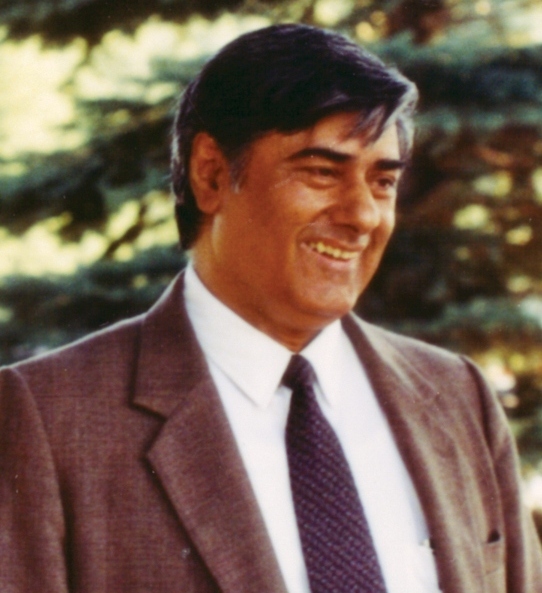
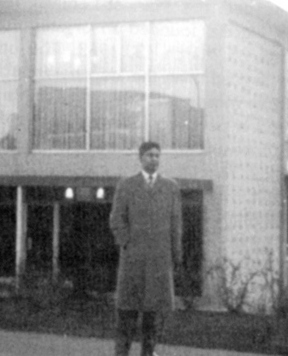
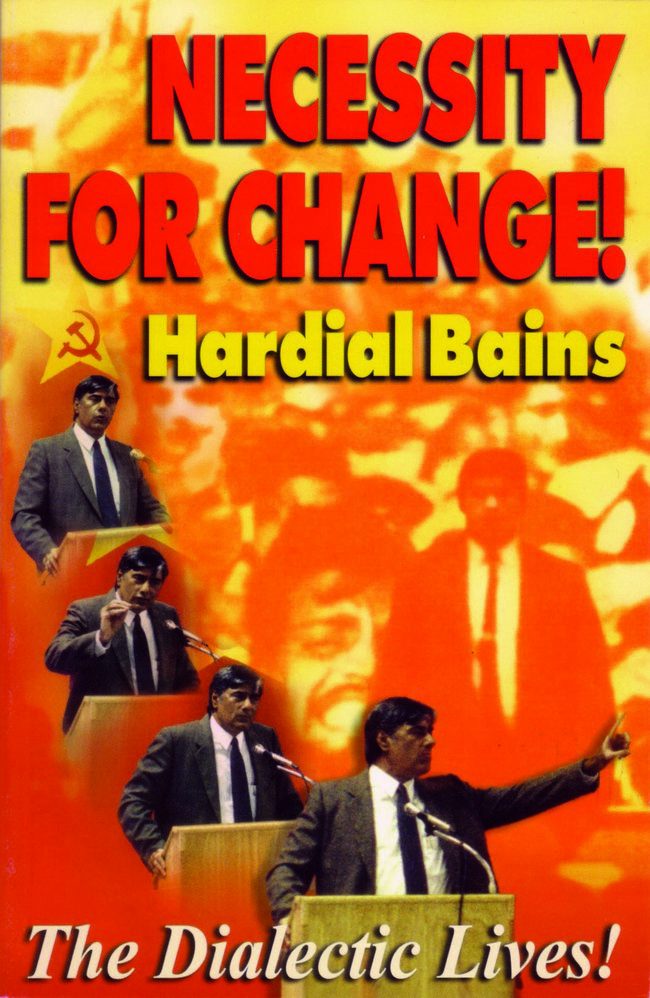 Of all the relevant writings and documents
Hardial Bains produced during his lifetime, the most significant was
the Necessity for Change analysis. It drew warranted conclusions about
the degenerate culture and conditions imposed on the youth as a result
of the Anglo-American imperialist influence during the 1960s and the
anti-communist crusade. Based on the Necessity for Change analysis, he
concluded that
Of all the relevant writings and documents
Hardial Bains produced during his lifetime, the most significant was
the Necessity for Change analysis. It drew warranted conclusions about
the degenerate culture and conditions imposed on the youth as a result
of the Anglo-American imperialist influence during the 1960s and the
anti-communist crusade. Based on the Necessity for Change analysis, he
concluded that 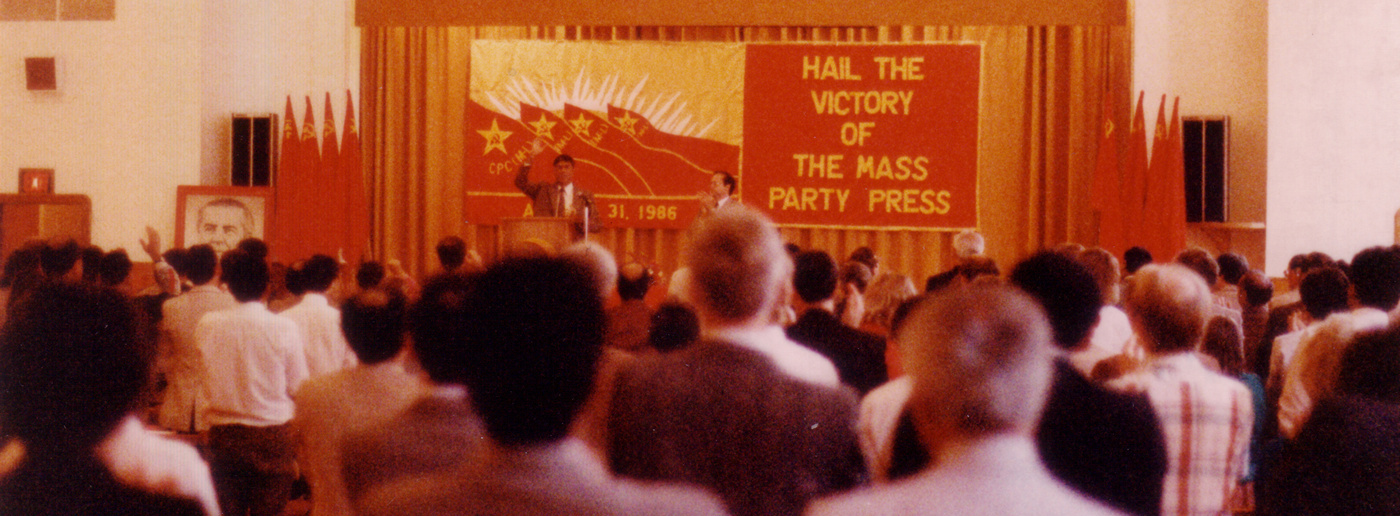 Hardial Bains addresses celebration
of successes in building the Mass Party Press,
Hardial Bains addresses celebration
of successes in building the Mass Party Press, 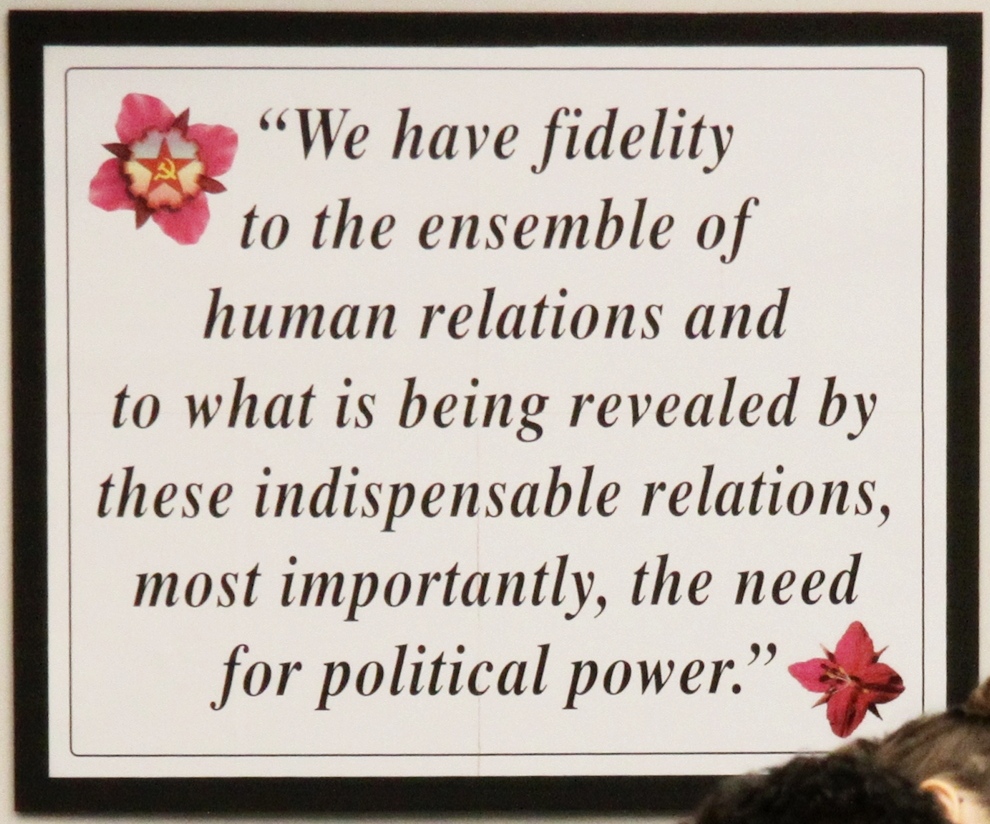 For instance, the
significance of fidelity to the ensemble of human relations is that
modern society has at its heart a power that mediates between the human
productive powers and the existing political association. Using
fidelity to the ensemble of human relations as a guide, we direct
attention to social structure, the order of it and what is its measure,
so that we can make predictions.
For instance, the
significance of fidelity to the ensemble of human relations is that
modern society has at its heart a power that mediates between the human
productive powers and the existing political association. Using
fidelity to the ensemble of human relations as a guide, we direct
attention to social structure, the order of it and what is its measure,
so that we can make predictions.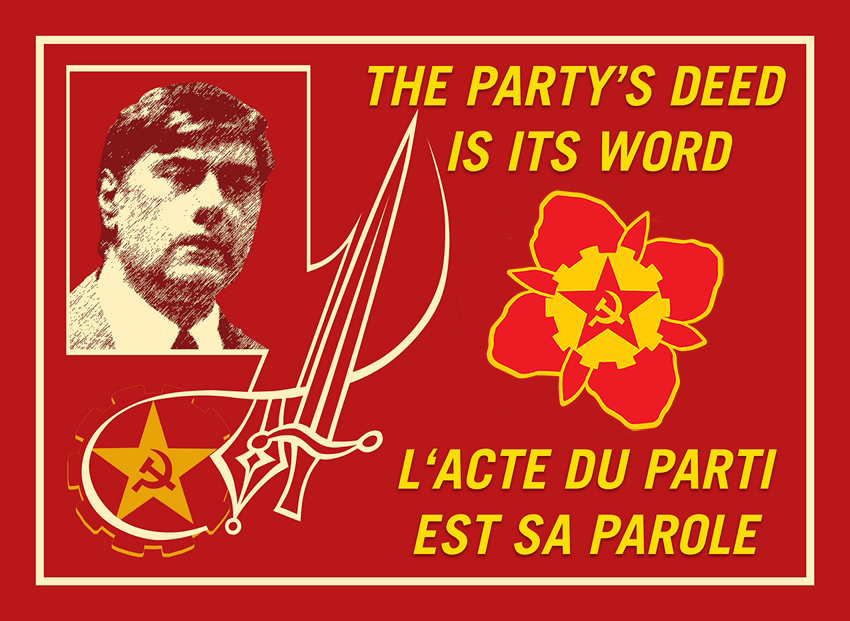

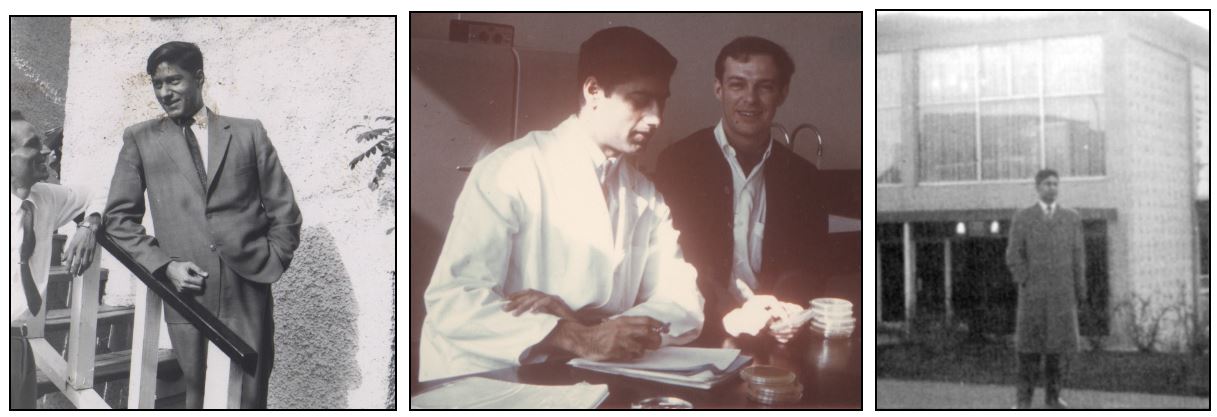 Hardial Bains shortly after his arrival in Canada
in 1960 (left); working in the lab; and in front of International House
at UBC in 1962.
Hardial Bains shortly after his arrival in Canada
in 1960 (left); working in the lab; and in front of International House
at UBC in 1962.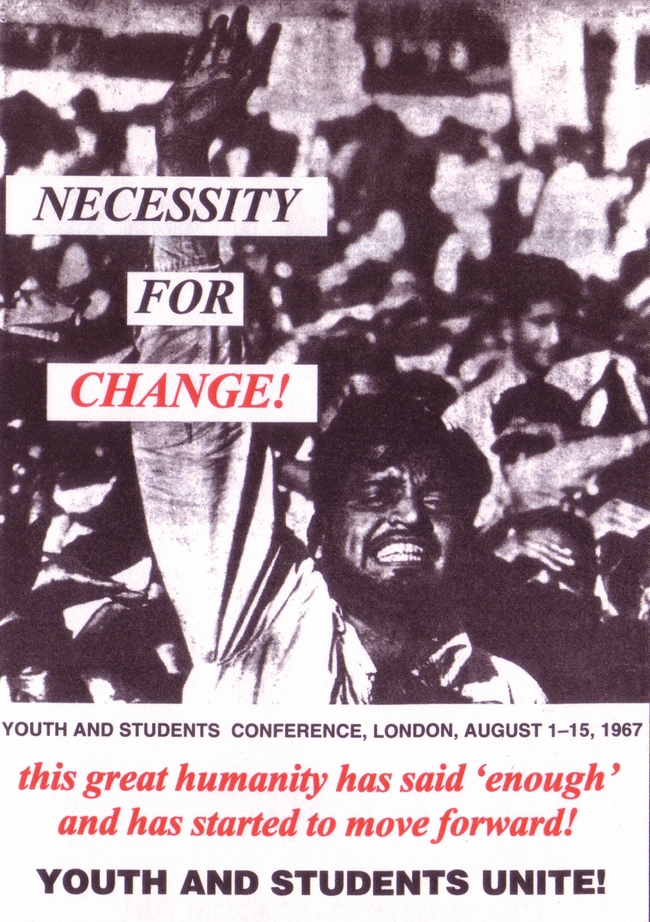 Hardial taught at Trinity
College in Dublin, Ireland from 1965 to 1967 as an exchange lecturer.
His teaching manual was still being used by the Department when Hardial
paid a visit to the university 25 years later.
Hardial taught at Trinity
College in Dublin, Ireland from 1965 to 1967 as an exchange lecturer.
His teaching manual was still being used by the Department when Hardial
paid a visit to the university 25 years later. Hardial Bains leads discussion at
the Necessity for Change Conference in London,
England
Hardial Bains leads discussion at
the Necessity for Change Conference in London,
England 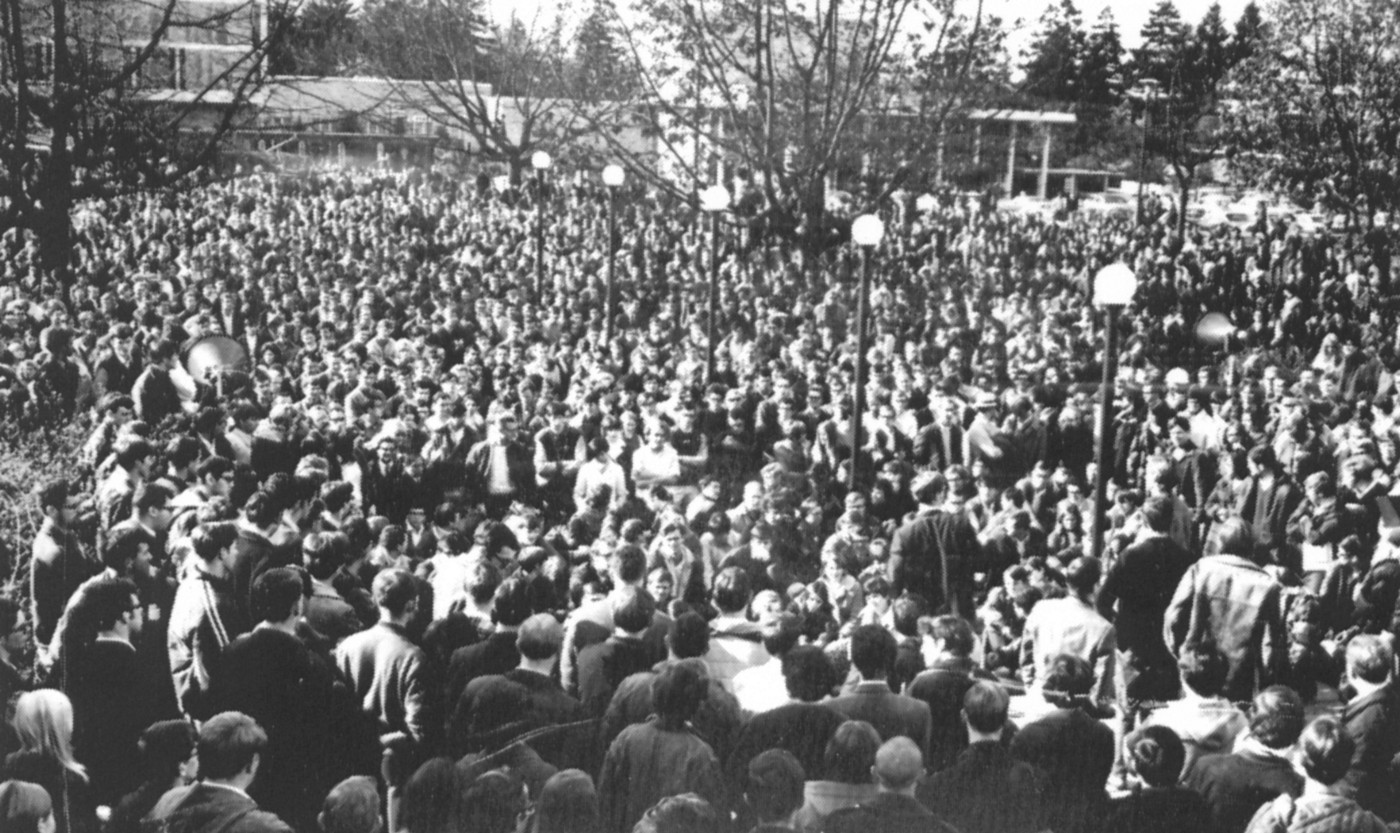
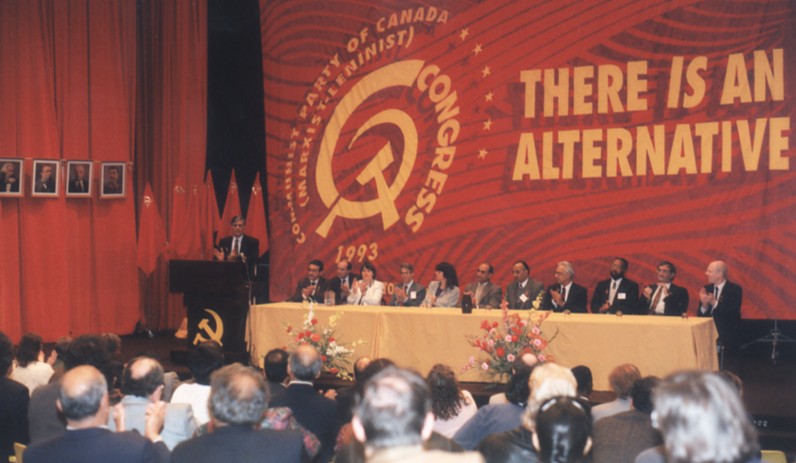 Hardial Bains addresses the Sixth
Congress of CPC(M-L) in October 1993.
Hardial Bains addresses the Sixth
Congress of CPC(M-L) in October 1993.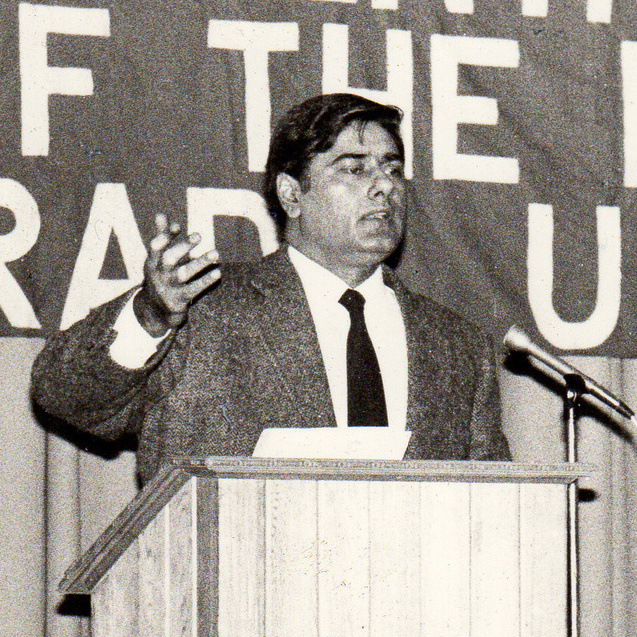
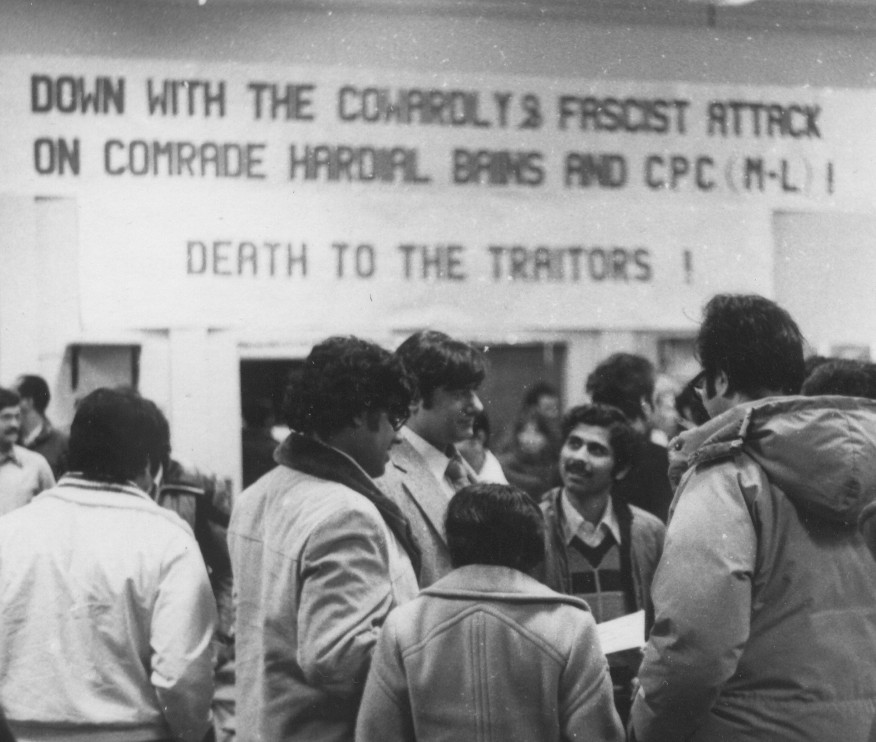 Hardial Bains at a rally called in
March 1977 after the Party's Workers' Centre was raided and he was
arrested on trumped-up charges.
Hardial Bains at a rally called in
March 1977 after the Party's Workers' Centre was raided and he was
arrested on trumped-up charges. 